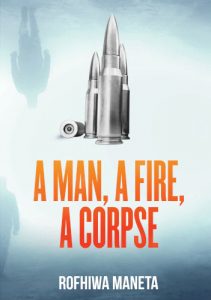The JRB presents an excerpt from Rofhiwa Maneta’s new book A Man, A Fire, A Corpse, a biography of his father, Captain Amos Maneta, ‘The Top Cop of Soweto’.

A Man, A Fire, A Corpse
Rofhiwa Maneta
BlackBird Books, 2022
20
There are too many things that don’t make sense about Mnisi’s story but Dad doesn’t want to reveal his hand too quickly. He tells Mnisi that they are going to his place to remove the corpse from his bedroom, but also to gather any other evidence that might still remain at the scene. Dad takes the phone and calls for someone at the station to drive down and take fingerprints at the scene. Outside of the house, a group of police officers has sectioned the place off and stands guard at the gate.
Dad gives Mnisi a chair and tells him to sit at the door.
‘What did you say happened here again?’ he asks, without waiting for a response. He puts his surgical gloves on and starts walking around the yard. Mnisi lives in a small back room detached from the main house. Dad only has to circle the room once to make a discovery that would poke more holes in Mnisi’s story. The outside back wall has a large, butterfly-shaped blood-spatter: the kind that is produced by blunt force trauma; a pattern that would emerge if, say, someone’s head was bashed repeatedly against the wall.
But there is something else. When Dad looks at the ground beneath him, there is a set of circular, deeply embedded footprints—the kind that indicates some sort of a struggle has most likely taken place.
‘What did you say happened here, again? Run me through the story.’
Mnisi keeps silent. Dad moves back into the sparsely furnished room and tells Mnisi to move his chair closer so he can see what Dad is doing. At this point, Mnisi is visibly nervous. Whenever Dad makes eye contact, he averts his gaze, either staring into the distance or at the space between his feet.
There is a washing basket with a few days’ worth of soiled laundry in it. Dad runs his hands through the items, throwing out the kind of items you’d expect: soiled underwear, a few shirts with food stains on them, the occasional shirt and shorts. Halfway through his search, though, he uncovers a pair of bloodied jeans. Mnisi lifts from his chair slightly and tries to peer at the basket.
‘I’d really like some water, please’, Mnisi tells Dad.
‘I’ll get you some water. Don’t worry. Just relax. Let me finish what I’m doing here first.’
Dad moves the jeans to the side, careful not to expose them to Mnisi. Toward the bottom of the pile, there is something else: a floral shirt. It is the kind you would often see in Soweto, luridly coloured, bright and garish and usually worn with a pair of skinny jeans and Carvela loafers. It also has blood on it.
‘How did you say the corpse ended up here again?’ Dad asks again, placing the bloodied jeans and shirt at the top of the laundry pile. Repetition is one of the most common interrogative tactics deployed by detectives. When a suspect is arrested, they are often asked the same question over and over. Because the truth is what it is—monolithic, immovable—anyone who is telling it would have no reason to repeat or divert from their story. Dad is trying to see if Mnisi will stay married to the narrative that someone had dumped his girlfriend’s body there.
~~~
- Rofhiwa Maneta is a Johannesburg-based writer and photographer whose journalism has been published locally by City Press, Sunday Times, Mail and Guardian as well as internationally by The Fader and VICE Magazine. A father of one, his work primarily focuses on the intersections of masculinity, race and music.
Publisher information
A Man, A Fire, A Corpse tells the story of Captain Amos Maneta: a man who was most often referred to as ‘The Top Cop of Soweto’; as written by his son Rofhiwa Maneta. The book is a collection of the physical and metaphysical bruises collected by the author’s father in his thirty-plus years of working in the police service.
Through his father’s story, Maneta examines the relationship between police and the public. Maneta’s mix of journalism, remembered history, anecdote and autobiography further discusses the relationship between South Africa and violence; while taking a look at what it takes to be an honest policeman in a department whose groundwater is corruption and maladministration.
